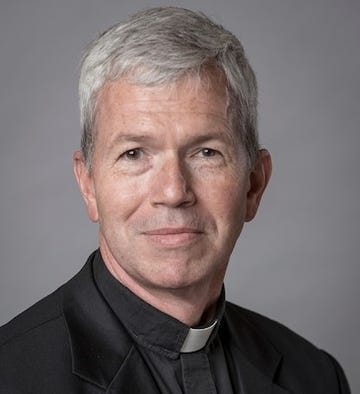Easygoing Holiness
Saying goodbye to a friend and mentor
It’s rare for someone to be a heavy hitter both intellectually and in the area of practical experience. People with ‘book smarts’ often end up spending too much time in the library. They know a lot, but they can become more familiar with ideas than with reality. And while those with practical experience admirably spend their days actually getting their hands dirty, that often leaves little time left over to learn and understand the wider context of their area of focus.
This tradeoff is usually unavoidable even when someone has strong potential in both areas. One of the many things which made Mosignor Daniel Trapp extraordinary was his depth and breadth of knowledge and experience. A priest of forty years in the Archdiocese of Detroit, Msgr. Trapp was a seasoned veteran who boasted an enviable resumé academically and pastorally. You’d be hard pressed to find a sharper and better read mind than his. You’d also be hard pressed to find a more reliable confidant in a sticky situation where books fall short. He was a man who had seen it all, who could understand most of it, and who could always respond with compassion, wisdom, and prayer.
During my time in seminary, I’ve struggled with disillusionment with the traditional academic approach to teaching. Even with excellent professors, the format of lectures and tests feels like a scattered, inefficient, and painfully dull way to learn. While I still think there’s lots of room for improvement, I’ve come to deeply appreciate something about learning through my eight years in higher education: it isn’t so much about learning what to think as it is about learning how to think.
What makes a class different from reading a Wikipedia page is the initiation into the material you receive from a living person who has walked the path before you. The intuitive feel an expert has for how to navigate and respond to the material isn’t something that can be recorded in a textbook; it has to be passed down. You need to marinate in the thought process of the professor. This takes time, and ideally it takes place in person. In my scripture classes I’ve learned about how when Jesus told his disciples to follow him, he was speaking in an all encompassing manner. To follow Jesus involved sharing one’s whole life with him. It didn’t merely mean memorizing his teachings, but seeing and absorbing the way he lived his life.
I had the extraordinary privilege of receiving spiritual direction from Msgr. Trapp. Over the course of our dozens of meetings, he gave countless pieces of insightful and reassuring counsel. But what taught me more and what will stay with me far above and beyond these was his example of easygoing holiness. His presence was an oasis of calm and love - a silent reminder and demonstration of the perspective a believer ought to have on life. Nothing is bigger than God, nothing is outside of his control and his love. No trial is so large and upsetting that we can’t calmly bring it before the Lord, confidently expecting his help.
I will dearly miss Msgr. Trapp, but I am beyond grateful for having known him, and for everything he did for me. Please pray for him and for those who are grieving his passing (including me!), especially during this week as the wake and funeral services wrap up. The world lost one of its better pictures of what it means to be holy and to love the way Jesus did. Tomorrow that picture will be buried, but one day it will rise in the same way its painter did. Goodbye for now Monsignor, I look forward to seeing you again.



